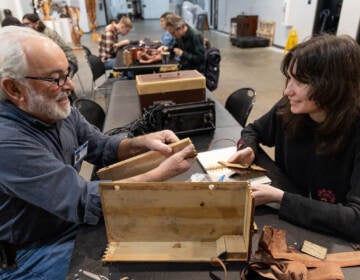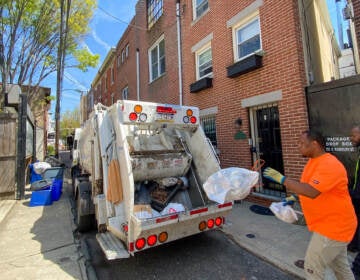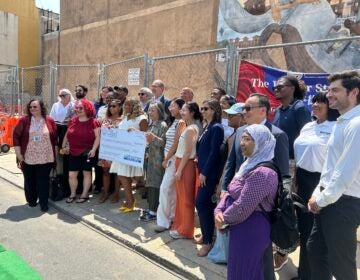Groups challenge Philly’s next mayor: End illegal dumping by 2028
A coalition of advocacy groups wants candidates running for mayor to commit to a platform of policies to end litter, illegal dumping, and other waste.
Listen 5:33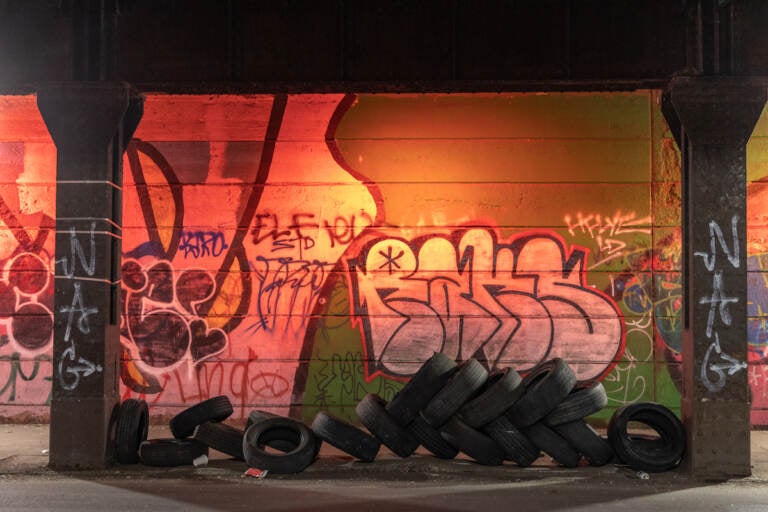
Tires left in an underpass on Belgrade Street in North Philadelphia. (Kimberly Paynter/WHYY)
This story is a part of the Every Voice, Every Vote series.
What questions do you have about the 2023 elections? What major issues do you want candidates to address? Let us know.
The empty lot on Marilyn Rodriguez’s street in North Philadelphia is an eyesore.
On a morning in December, pieces of broken cement, wooden boards, plastic containers and bags, a suitcase, and other debris filled the narrow, grassy lot.
“Now I see a tire,” Rodriguez said. “They start putting tires here, it’s going to get ugly. They’re going to set it on fire.”
Rodriguez, an artist and education director at Taller Puertorriqueño, has lived in a rowhouse in Philly’s Fairhill neighborhood for more than three decades. She cleaned up the empty lot on her block last spring, alongside other members of a local anti-dumping activist group — only to find it dumped on again later last year. Since then, it’s only gotten worse.
“I’ve never seen, in all my years living, so much trash,” Rodriguez said. “It seems to get worse and worse and worse.”
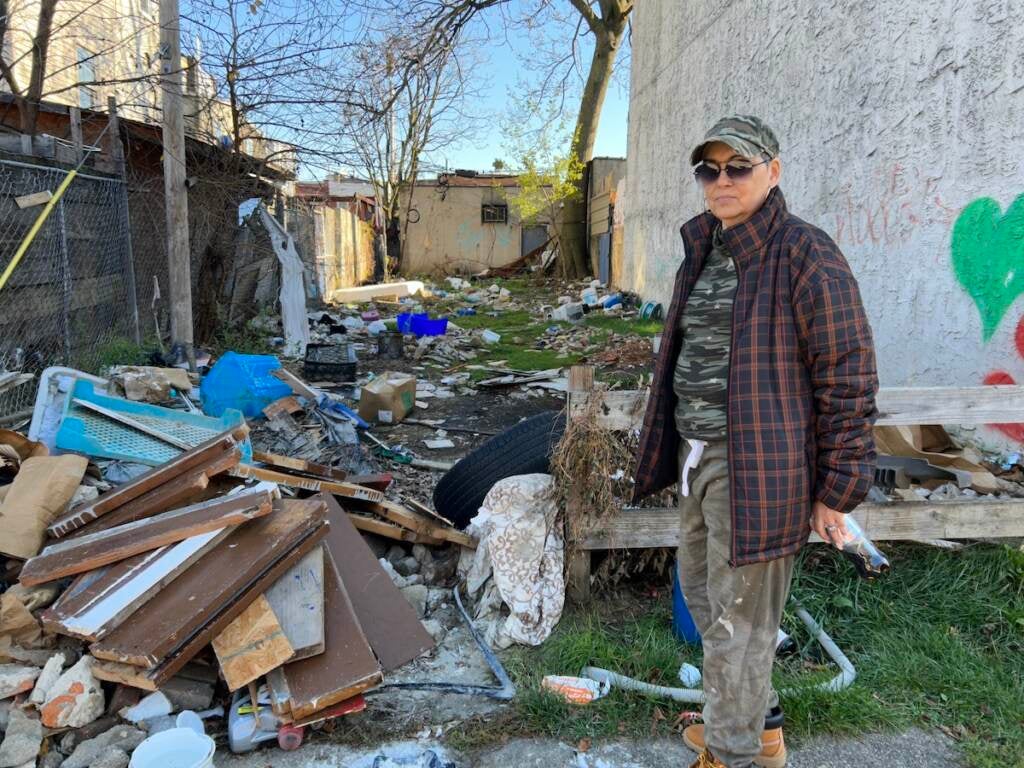
Illegal dumping has been a problem in Philadelphia for decades. The city’s strategies to clean up debris and hold dumpers accountable have failed to prevent discarded tires, mattresses, and construction debris from piling up in neighborhoods.
Now, a coalition of advocacy groups known as Waste Free Philly wants the city’s next mayor to end illegal dumping and littering by 2028. They plan to release a platform of zero-waste solutions Wednesday that they’ll challenge mayoral candidates to commit to.
“There’s ways to stop it, but we need a mayor who will promise to do that,” said Dallas Herbert, Sr., a resident of Philly’s Lawncrest section who helped develop the platform. “We need a mayor who will concentrate on stopping illegal dumping.”
Dumping ‘takes our neighborhood and community down’
Litter and illegal dumping are worst in some of the city’s poorest neighborhoods, including parts of North, West, and Southwest Philly, according to the city’s litter index from 2017 and 2018.
“Let’s just be real,” said Herbert, who’s been fighting illegal dumping in his neighborhood for years. “There are places you can go where there are no dumping in Philadelphia, because they don’t stand for it. But they’ll do it in the Black and brown neighborhoods. We know that’s where it’s concentrated.”
People who work on the issue say much of the illegally dumped material comes from small haulers and contractors looking to save money on disposal costs.
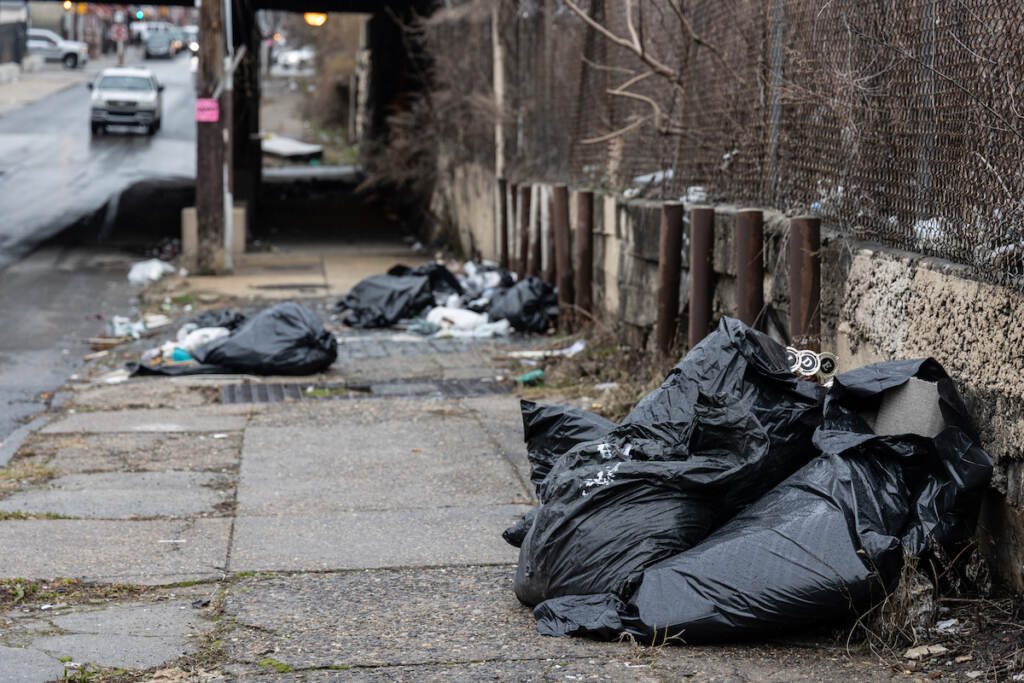
“There is so much construction going on, and some of these construction companies don’t want to pay the fees to go dump the trash,” Rodriguez said. “So they find an abandoned area or lot, and then late at night or early morning, they take and dump all the trash here. We have found construction walls, two-by-fours, trash of just cleaning out the houses — like literally bags and bags and bags.”
Community cleanups also turn up personal items from house cleanouts, evictions, or people leaving in hurry, said Julie Slavet, director of the Tookany/Tacony-Frankford Watershed Partnership, who has organized cleanups in Tacony Creek Park.
“What you’re seeing is really people’s lives falling apart,” she said.
Constant illegal dumping hurts a neighborhood’s morale, Rodriguez said.
“[Dumping] creates all the hardship and trash-looking ugliness that takes our neighborhood and community down,” Rodriguez said. “I find that this city just tends to just ignore us. We’re like the forgotten souls.”
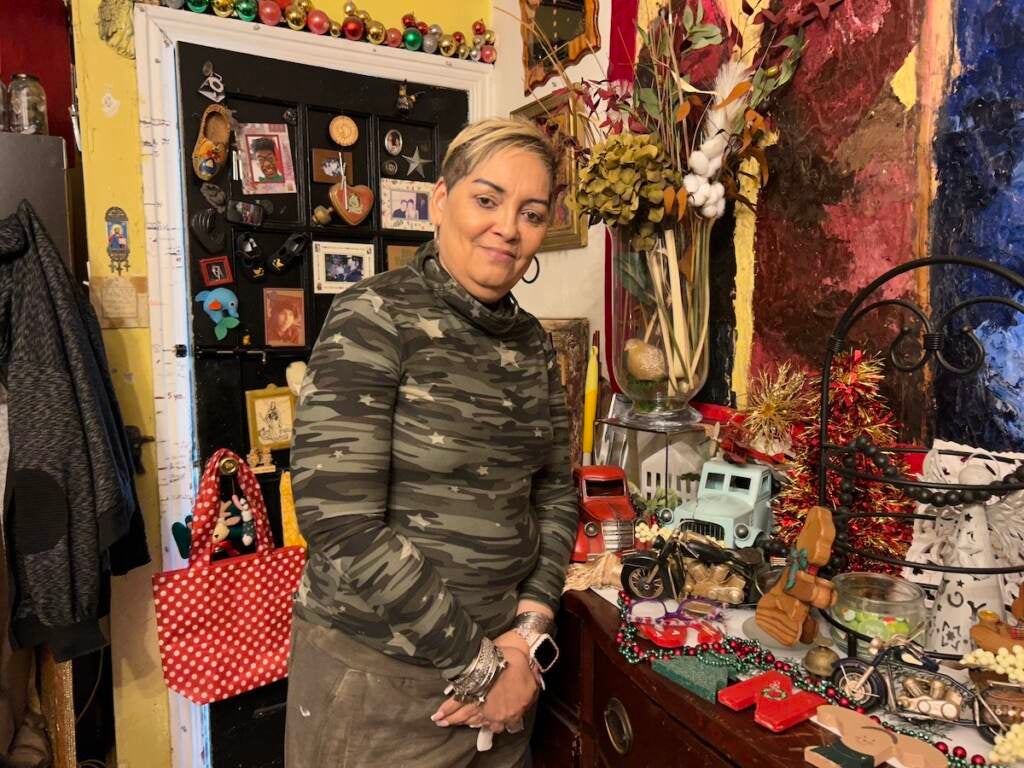
Years of city efforts fail to stem the tide of trash
Residents say the city isn’t responsive enough when they report instances of illegal dumping.
“When we call it into … 311, it takes weeks, months, or years even to have resolution,” Oskar Castro, who frequently deals with illegal dumping near his Southwest Philly home, told PlanPhilly in November.
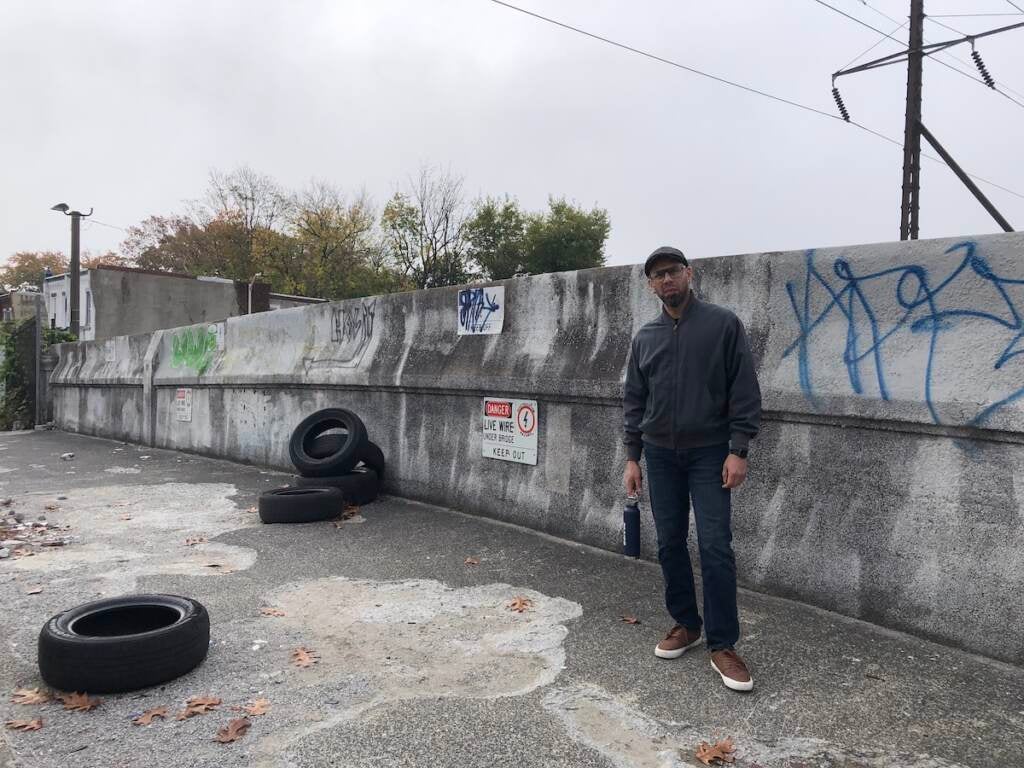
But the problem is on the city’s radar.
Philadelphia has raised fines, tracked who’s hauling construction debris in the city, and installed surveillance cameras at dumping hotspots.
So far, the city has seen limited success. Illegal dumping remains one of the top issues residents report through 311. The city spends around $48 million dollars per year to deal with litter and illegal dumping — most of that to clean up litter — according to a 2020 statewide study by Keep Pennsylvania Beautiful. Each year, the city cleans up thousands of tons of litter and illegally dumped debris, defined as debris cleaned up outside of normal trash collection — over 8,000 tons in 2022 alone, according to the Streets Department.
Last year, the city started fining each large dumped item separately and collected a historic nearly $11,000 from one illegal dumper caught on camera — a sum which included cleanup costs.
“That’s big because that’s a huge cost to taxpayers,” Streets Department Commissioner Carlton Williams said. “When people have to pay that, they’re less likely to take the risk of dumping when they know they’re going to get caught and have to pay such huge fines.”
Williams told PlanPhilly in November he plans to roll out additional cleanup crews this spring to respond to 311 complaints faster, and focus on civil, rather than criminal, prosecutions of dumpers.
“The civil process allows us to assess the fines and go after people for restitution at a much greater pace,” he said.
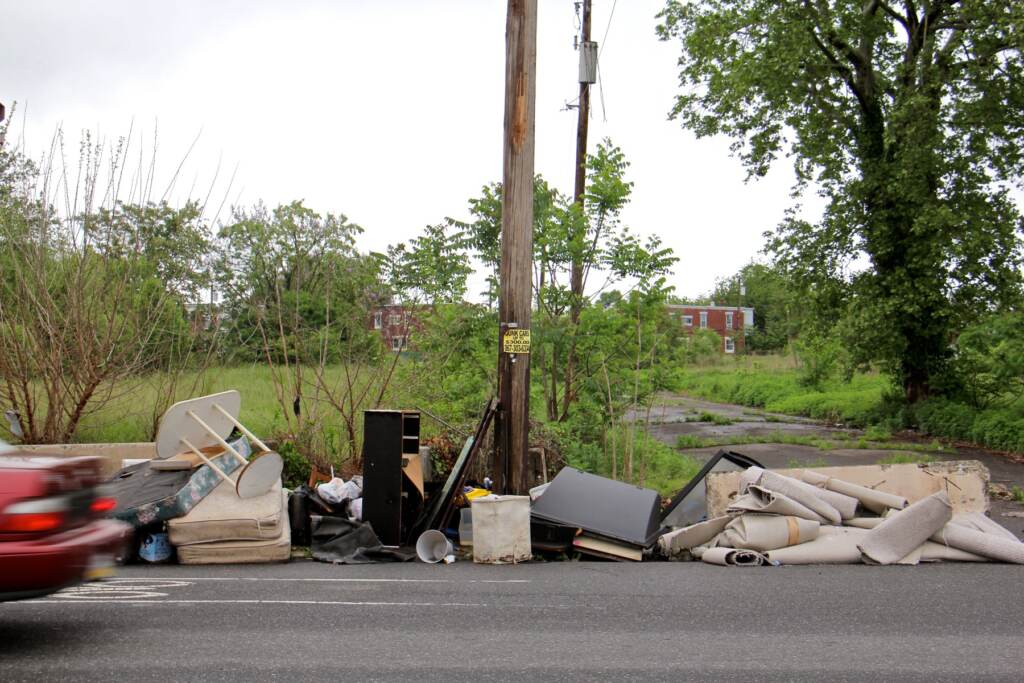
A dumping platform for Philly’s next mayor
Community groups hope Philly’s next mayor will go further.
Critics say a misstep of the current administration was eliminating the office that coordinated the city’s cleaning and anti-waste efforts in 2020.
“Just bring back the Zero Waste and Litter Cabinet action plan, the strategy, and build on top of it,” said Nic Esposito, director of policy and engagement at Circular Philadelphia and the city’s former Zero Waste and Litter director. “It wasn’t perfect, it wasn’t fully done — things needed to be put in place — but you have a template. You have a plan.”
Mural Arts’ Trash Academy, Clean Water Action, various neighborhood groups, and residents spent months last year sharing knowledge about illegal dumping in order to develop a platform of solutions, called the Clean Philadelphia NOW Campaign, said Trash Academy founder Shari Hersh. The coalition will launch its plan for tackling dumping and litter under Waste Free Philly’s broader platform Wednesday.
“I have faith,” said Herbert, the Lawncrest resident who helped develop the platform. “We can actually get some types of promises from the elected officials before they get there.”
Authors of the Clean Philadelphia NOW Campaign hope candidates will adopt the platform wholesale, rather than pick and choose individual policy points. It includes a commitment to re-establish an entity like the city’s slashed Zero Waste and Litter Cabinet, as well as strategies in the areas of prevention, abatement, enforcement, and education.
“Cleaning on its own does not work,” said Hersh, who leads Mural Arts’ environmental justice efforts. “You just have to clean again. It does not stop dumping.”
Members of the Clean Philadelphia NOW Campaign want mayoral and council candidates to commit to an effective system of monitoring, including city-run security cameras. That’s an issue Herbert has first-hand experience with.
Herbert started working on illegal dumping after he got a flat tire driving up a street near his house where debris is frequently dumped.
Herbert started taking photos of the dumping. He organized cleanups alongside other local members of 215 People’s Alliance. He and his neighbors called their elected officials for two years until the city installed surveillance cameras, he said.
Herbert thinks the cameras are working to deter major dumping.
“It’s not that bad anymore,” he said. “But it is still there. It is still present.”
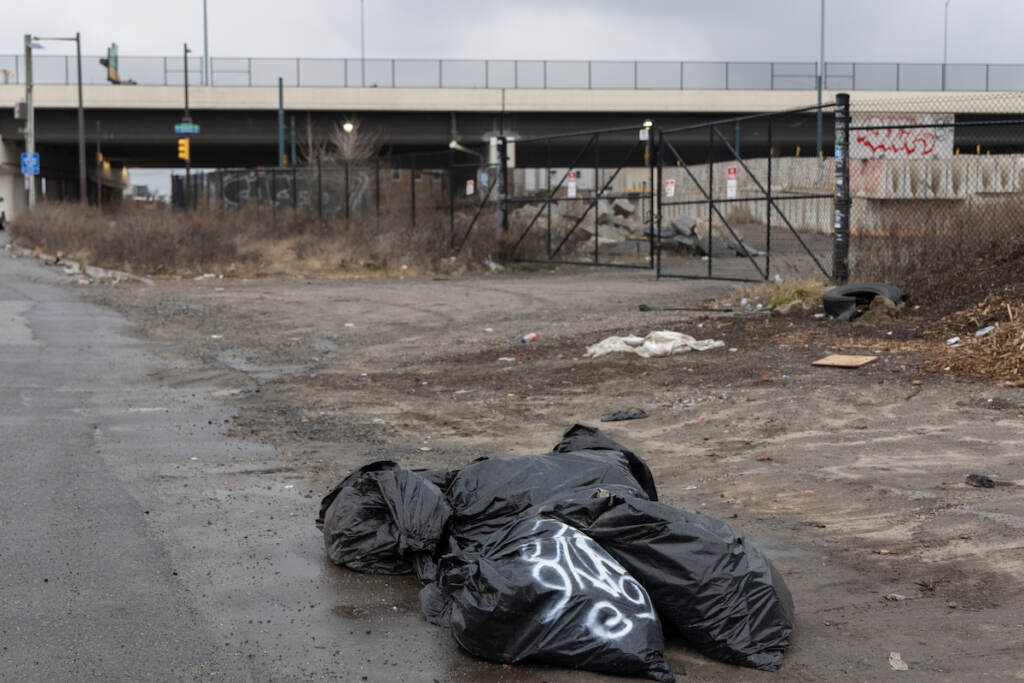
But Herbert worries the effect could wear off, if dumpers don’t see consequences.
The city has roughly 225 cameras installed to catch dumpers across the city, but just five employees to watch the footage, according to the Streets Department.
“What we need is more people to pay attention to what’s going on,” Herbert said.
Members of the Clean Philadelphia NOW Campaign also want the city to compensate residents who clean up their own neighborhoods for free.
The platform includes prevention strategies, including re-starting curbside pickup for big items, like mattresses and refrigerators, and letting small haulers dump at city-run sanitation convenience centers, which currently bar commercial contractors.
“If the city could make a place or two to dump trash [for] $35, $40, it would give the guys more incentives to do the right thing, and you still come up with a couple dollars in your pocket, which is what the whole thing is about,” Herbert said.
The Clean Philadelphia NOW Campaign also calls for the city to “activate” vacant lots with community gardens, murals, and programming.
Castro says the city doesn’t communicate effectively with residents of his Southwest Philly neighborhood about what types of waste the city does not accept in its routine curbside trash collection — like tires or TVs.
“We have a lot of folks who are from different parts of the world. This is a really rich immigrant community, and I don’t think the city does enough to talk to the people in this community in the ways that they need to be talked to,” Castro said.
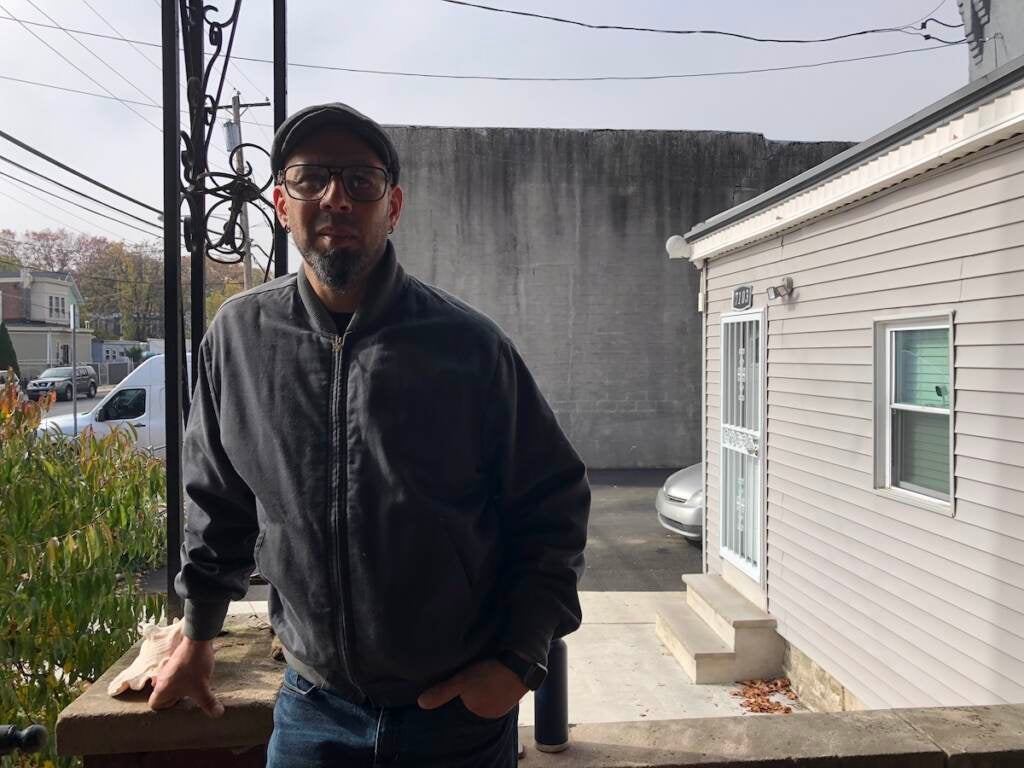
The platform includes education and outreach, developed in coordination with residents.
Herbert is hopeful that the coalition’s activism will bring results.
“Before the next election, we hope to put the right person in that’ll move this, make this a priority — the beautification of Philadelphia, period,” Herbert said. “Not just Center City. … The people around here deserve to have a clean community.”
WHYY’s Susan Phillips contributed reporting.
 This story is a part of Every Voice, Every Vote, a collaborative project managed by The Lenfest Institute for Journalism. Lead support is provided by the William Penn Foundation with additional funding from The Lenfest Institute, Peter and Judy Leone, the John S. and James L. Knight Foundation, Harriet and Larry Weiss, and the Wyncote Foundation, among others. Learn more about the project and view a full list of supporters here.
This story is a part of Every Voice, Every Vote, a collaborative project managed by The Lenfest Institute for Journalism. Lead support is provided by the William Penn Foundation with additional funding from The Lenfest Institute, Peter and Judy Leone, the John S. and James L. Knight Foundation, Harriet and Larry Weiss, and the Wyncote Foundation, among others. Learn more about the project and view a full list of supporters here.

Subscribe to PlanPhilly
WHYY is your source for fact-based, in-depth journalism and information. As a nonprofit organization, we rely on financial support from readers like you. Please give today.





